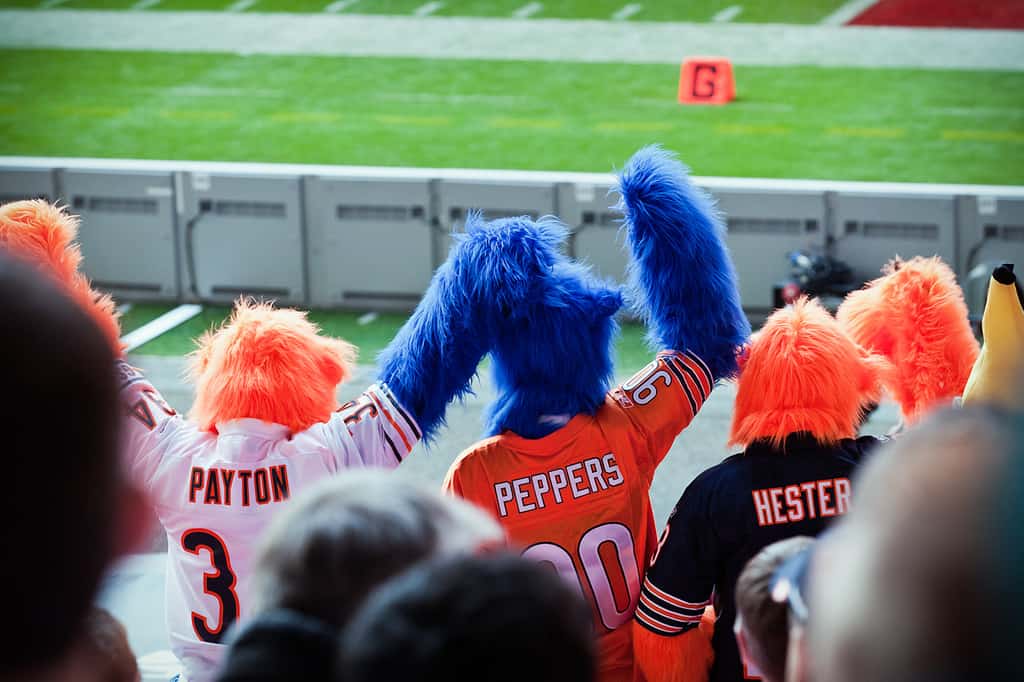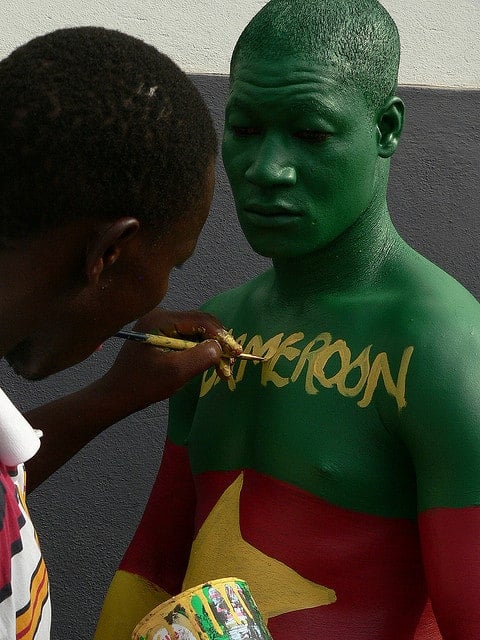When I was younger, my friends and I used to dress up in matching costumes and play a game in which we pretended to fight fierce creatures like “wildcats” and “bears.” We were in our late teens at the time, and our game is more commonly known as high school basketball.
Here in Dar es Salaam a decade later, I sometimes catch a community member (from India) watching cricket, his national obsession, and wonder why on earth people would be interested in such a silly game. Growing up in the most beautiful state in the nation (read: Iowa), I have come to believe that our sports, like basketball and American football, are clearly superior to games that use terms like “googly” and “wicket.” There are other times, though, like when I sit down beside my Indian brother, when I can step back for a second and think about our sports from another perspective, see them for a moment the way I see a game like cricket.
Let’s look at football: you have adult men, twice my size, wearing shiny outfits with sparkly helmets. These enormous men can be observed throwing themselves at each other, almost guaranteeing themselves future discomfort – and possibly serious brain damage – following rules that seem to make no sense, especially to someone who did not grow up with the game. This entire course of affairs is overseen by an apparently god-like figure dressed like a zebra, who makes decisions that cause thousands of people to yell at their televisions. Apparently this zebra-clad-demi-god has long range powers of hearing and cares what American viewers think. Oh yeah, and I’m one of those yelling people. Weird.
***
It’s truly dizzying to think about how much time, money, energy, and human emotion goes into games that are, well, games. Stranger still when I notice how we even create games about the games, and how we spend an inordinate amount of time assembling fantasy teams1 or competing in office pools.2
Not that I can put myself outside all this commotion – no, I’m a more or less rabid fan myself. If Notre Dame loses a big game, I feel it; I swallow the loss like a dumbbell and carry it around inside me for days. If the Miami Heat face an elimination game, I am noticeably nervous before tipoff.3
At the same time, my emotional investment is strangely selective. If the Blackhawks win the cup, I think, “Oh, that’s cool. I used to live in Chicago.” If Serena loses the U.S. Open this weekend, I’ll think, “Oh, that’s too bad. Now… what shall I eat.” And while I enjoy watching soccer with my community members, my bed is often more attractive than watching a late-night game. I like any number of teams and players – just as you are welcome to “like” this article by clicking on the thumbs-up above – but only a few can make or break my heart.
Knowing that I don’t have a serious interest in most of your favorite players or sports (and knowing that you could probably care less about the particular teams in which I am invested) seems to throw the value of all this fan fanaticism into question. After all, if the vast majority of people could care less, why should I care so much? Clearly, there are physical and mental benefits to participating in sports, but what about watching other people do the actual work of running, jumping, throwing, and kicking? Is following sports simply a massive waste of time and energy?
Speaking of wastes, fans of all kinds have just completed our yearly trek across the driest of sports-season wastelands. The NBA Finals finished months ago. Baseball was in the dog days of summer. And, as a dreaded odd-numbered year, we didn’t even have an Olympics or a World Cup to satisfy our addiction. To me, the odd-year summertime sports wasteland always feels like a horrible Lenten fast I did not choose.
But today, my friends and fellow fans, today. Today marks the end of our long trek – and perhaps it also marks the perfect time to look at the value of getting wrapped up in sports – because today the college football season starts. And for us fans, that is a very good thing indeed.4
I bring all this fandom reflections up because, ultimately, following sports – even if we run the risk of becoming a little too obsessed – is valuable. And it’s valuable because it provides some of the best practice for life. For example, by identifying with a team or a player, non-Cubs fans are able to experience the full range of human emotions but without any real consequences.5 (I say non-Cubs fans, because we all know that Cubs fans experience only one emotional patterns: delusional hope followed by bitter disappointment.)6 Or this: when I’m cheering for the Fighting Irish I can swing from laughter to tears to faster than a toddler at bedtime. Whether “we” win or lose, however, my life is outwardly the same, though I can presumably learn from the experience.
***
In many ways, sports fandom is like great literature. (If you’re thinking, wait, you’re comparing LeBron and Brian Kelly to Shakespeare and Dostoevsky? The answer is yes. Yes, I am.) While I understand more about myself and the human condition when I read about Hamlet and Alyosha my external world does not really change – the same with fandom.
One key difference, however, is that while War and Peace moved me, it took much, much more time than when “Jesus Shuttlesworth” (if don’t know that reference watch this) hit the “shot heard ’round the world”7 to force overtime in game six of the NBA finals. I may or may not have stood up and yelled: “try hitting a last-second three without even looking at the position of your feet, Tolstoy!”
One key similarity is that both literature and fandom can prepare us for life. When your team actually wins the big game, for example, sports is an opportunity for joyful celebration – a key part of the spiritual life. I do not normally hug random strangers, though this can be perfectly acceptable in a bar or stadium when the team you’re cheering for wins a big game. Loud Dude Who’s Had One Too Many, I love you, man. College Student Who Sneaked Alcohol Into The Game, let’s hug. It’s sacramental.
Following sports, of course, prepares us for less celebratory times as well. No matter how hard we try, there are usually others who are better. In a 30-team league, 29 teams end their year in disappointment. Like in life, there are times when there is nothing we can do to avoid defeat and embarrassment, especially when you know you’re going to see that annoying coworker or classmate who cheers for the rival team on Monday morning.
Plus, as a fan forever scarred because of watching the illegal “Bush Push” in person, sports has taught me that sometimes life just isn’t fair. There are bad calls, freak injuries, off days, and commissioners who do whatever they want for “basketball reasons.” What “should” happen often does not become reality. It’s easy to raise a-million-and-one “what if” questions that ultimately are not helpful – though they certainly give us something to talk about. As my friend (and fellow TJP-er) Joe Simmons likes to say, we don’t remember all the green lights we get. While I can still dwell on the red lights in my own life, sports at least gives me practice for dealing with them.
***
It comes down to this: sports, while also showing us the potential for ugly division, illustrates how it is possible to unite the world – in fandom as well as competition. Admittedly, my sports fandom has led me to have irrational prejudices (my brother and I would not even think about going to the University of Michigan, a great school, because they were The Enemy… I’ve never met Ann Arbor, but because both teams I cheered for growing up played against Michigan each year, I’ve been bombarded by t-shirt messages that did not say kind things about the state.)
But what makes something like the Olympics so beautiful, however, is that it unites people from around the world – athletes and fans both. Even if we might cheer in a special way for our own country, we can all stand in amazement at someone like Usain Bolt. I once watched the World Cup with a group of people from thirteen of the 32 teams that played that year, and while we would give each other a hard time if our countries competed, we were united in watching this display, even when we were not united by language, religion, sex, occupation, or personality.
And one last thing, sports has taught me better than anything else that there’s always hope. After all, if the L.A. Clippers can rise from being the biggest laughingstock in all of sports to the place where the third best player in the world chooses to play, then maybe I am also not defined by my past and the mistakes I’ve made. No matter what I have done today, I always have the future to improve.
There’s always next year – even for us spiritual Cubs.
***
The cover image by Flickr user Brainless Angel can be found here.
— — // — —
- I imagine that many people who made fun of others for playing Dungeons and Dragons are now just as obsessed with their own fantasy games. ↩
- It can be a huge distraction and addiction, and March Madness in particular can be deadly for office productivity. ↩
- Editor’s public service announcement note: The Jesuit Post does not condone anyone being, staying, or becoming a fan of the Heat. ↩
- I had already formed my opinion that sports are not opposed to the spiritual life long ago, though I was excited to read Pope Francis’ non-words (?) at World Youth Day: “We need saints who love the movies, dance, sports, theater.” ↩
- Granted, owners and professional players can make much more money if their teams succeed, and a city’s economy, especially in a small market like Oklahoma City, is affected by how their team does ↩
- Hey, but what a great ballpark! ↩
- Well, I was halfway around the world, and my sleeping community members certainly heard my reaction to it. ↩





